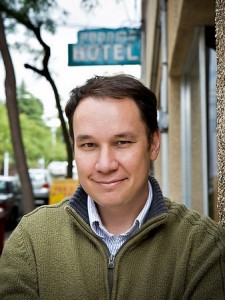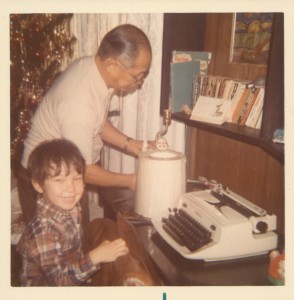by Katherine Sims, Book-It TeenTix Writing Project Contributor
Jamie Ford chatted with Book-It Repertory Theatre over tea at the real-life Hotel on the Corner of Bitter and Sweet—the Panama Hotel located in Seattle’s International District.
Ford’s novel begins with middle-aged widower Henry Lee visiting the Panama Hotel to discover that the abandoned belongings of Japanese-Americans have been unearthed in the hotel’s basement. This event sparks a return to the 1940s in Henry’s memory, when he formed a relationship with Keiko Okabe, the only other Asian-American at Rainier Elementary, despite opposition from his proud Chinese father.
The day of Book-It’s interview was significant. It was the first rehearsal of the stage adaptation of his novel and the cast was gathering together in the historic hotel’s tea room for the first read-through.

What kind of input, if any, did you have in the Book-It production of Hotel on the Corner of Bitter and Sweet?
Not a ton aside from writing the book. I really have wanted to stay out of the process. I have a lot of respect for people in the theatre world and I’m curious to see what they do with it. I get a lot of control with the novel and I’m really happy with that, so with the stage adaptation I don’t feel like I need to be another cook in the kitchen. This is my first time meeting with the entire group—director and cast. I’m excited, but I’m also a little nervous. It’s just weird to see someone speaking the words of my characters. This will be a new experience for me.
If given the chance, what would you say to the actors of this production?
(Chuckles)…good luck! And thank you. I’m just in awe of this. Each time there’s a new benchmark for success I’m still surprised. I feel like my book has a career and I’m just along for the ride at this point.
Is there any liberty you wouldn’t want to give a production?
I don’t want them to change my main characters and make them white. I know that sounds ludicrous but a lot of Hollywood producers are really interested in the book but they’re trying to find ways to inject a white male lead into the plot.
Did you grow up here in the International District?
Not directly around here. My grandparents lived up inBeacon Hill; my dad grew up in this neighborhood. My dad went to theChongWaSchooland Bailey Gatzert Elementary. I actually lived in Port Orchard, but then I moved to Seattle and lived up on Capitol Hill. I’ve spent a lot of time in this area. My parents met at the Wah Mee Club, which is a backroom gambling parlor. I just have a lot of affinity for this neighborhood; it’s an area that I’m very comfortable in.
Has the International District changed much over the years and how?
In some ways it has definitely, and in others it’s still a time warp. Usually International districts or Chinatowns, they get stuck, for a variety of reasons. But I think there’s been a bit of resurgence in this area; the new Wing Luke, the new Uwajimaya. But you can still look around and see buildings that are really old or unoccupied or haven’t changed. It’s nice to see the neighborhood being preserved in a way.
Did you bring any elements from your childhood into the novel?
A lot of boyhood angst. I’m half-Chinese, and I think kids that are half anything, they have a hard time fitting in or feeling comfortable. My dad spoke Chinese, but I didn’t speak any Chinese so I didn’t feel Chinese enough. But we ate chicken feet and white fungus, and you know all kinds of crazy stuff, very ethnic Chinese foods. That was always a source of discomfort for my neighborhood friends when they find out I’m eating dried squid or something like that. So you always feel somewhat of an oddball.
Also, my Dad’s stories and my grandfather’s stories of growing up here. My Dad wore one of those “I am Chinese” buttons that’s in the book and so did his cousins. That’s how the story began.
How did you go about writing from both a younger perspective and an older perspective?
The younger perspective was really easy, because I think my maturity level is that of about a fifteen-year-old. For the older perspective, I was very close to my Chinese grandfather and I just channeled a lot of that. That’s the fun of writing fiction; you get to put yourself in the mind of different characters.
At this point in the interview, the entire cast of the play walks by. “Oh look, there’s Henry! Hi, Henry!”
Have you had any contact with readers who say they have had experiences similar to those of Henry or Keiko?
I’ve had lots of letters and emails from older readers, especially readers that really grew up in that time period. I have a lot of people who are eighty years old and say “I was twelve years old in 1942, I was Henry’s age.” I get a lot of emails of “I was Keiko” or “I was Henry” or “This is my love story and we broke up and that was fifty years ago and I’ve always wondered where he is.” It’s amazing that people identify so intimately with those characters.
People probably want to know what happens next…
I think the best stories end where there’s a new story beginning in the mind of a reader and that’s what I hope to accomplish. So I really don’t know what happens next, but I hope something good.
So you don’t have an ending in mind?
No, I don’t have a secret director’s cut that I’m going to release on the DVD extras.

Have you always wanted to become a writer?
Actually I went to art school, so my degree is in art and design. But probably from my early twenties I was always writing poetry or fumbling around with fiction. I started taking it really seriously about seven or eight years ago, started going to writer’s conferences and really pushing myself, and seeking out tough criticism. I left my job to write full time about four years ago. I just envisioned I’d write for a few years until I ran out of money, but so far so good.
So do you have any plans to write another novel involving the International District?
I do! The new book I’m set to turn in at the end of this month is set in and around Seattle, a good portion in the International District, set between the years of 1921 and 1931.
Did you do a lot of research for both historical novels?
I read a lot of non-fiction stuff and I dig up old newspaper articles and magazines and interview people. I spend a lot of time reading dusty out-of-print books that most people would think are boring, but are kind of cool for me.
How did the Panama Hotel—where we are sitting right now—come into play, while writing the book?
It’s really weird, the Panama Hotel is almost like a character in the book right now; it’s this non-fiction character. It’s this narrative bridge between the two eras. It’s really cool to see people coming down and touring the hotel and checking out the neighborhood. It’s kind of taking on a life of its own. I never would have imagined it.
Book-It Repertory Theatre’s production of Hotel on the Corner of Bitter and Sweet by Jamie Ford will run September 18 – October 28.